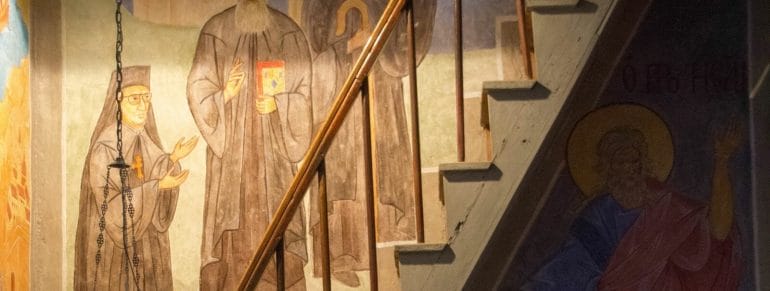The Spiritual Lessons from Desert Monks
4 Spiritual Lessons from Desert Monks for Our Daily Life
Even after centuries, the Desert Fathers' wisdom still has the power to transform our daily lives.
The vision of personal consecration to God within a sacred community developed differently in two distinct branches in the history of Christianity: The Eastern and the Western.
The Desert Monks and Eastern monasticism arose first, which was influenced St. Benedict in the formulation and the foundation of monastic life in the West.
Eastern monasticism's spiritual roots go back to St. Paul the Hermit in the third century, and to St. Anthony the Great, shortly after that. Its formalization, however, occurred with St. Basil of Caesarea and St. Pachomius (1) in the fourth century. Around the year 357, St. Basil traveled to Palestine, Egypt, Syria, and Mesopotamia to study these monastic communities' lives- the fathers of the desert and discover their secret of holiness.
Although St. Basil admired the severe asceticism and the devout prayer life that the hermits lived, he considered the monasteries needed balance. He then wrote a kind of "rule" to govern the monks' daily lives and moderate their extreme way of life. Thanks to this regularization's great success, St. Basil was later recognized as the "Father of Eastern monasticism."
This life wholly dedicated to God has much to teach us in the twenty-first century. St. Basil's wisdom and the Fathers of the Desert have influenced countless saints over the centuries and are still highly relevant today.

These are four spiritual lessons that we can learn from Eastern monasticism and apply in our daily lives:
1 - Pray without ceasing.
St. Basil writes:
"Should we pray without ceasing? Is it possible to obey such a commandment? The power of prayer lies more in our soul's purpose and in the acts of virtue that we extend to every part and moment of our life. 'Whatever you eat,' it is written, 'Whether you drink or whatever you do, do all to the glory of God.' As you sit at the table, pray. When you raise the bread, give thanks to the Creator ... When you put on the tunic, give thanks to the Giver. As you wrap yourself in the robe, you feel an even greater love for God, who, in summer and winter, provides us with our proper clothing, both to preserve our lives and to cover what is improper in sight. Have you had the day yet? Give thanks to Him, who has given us the sun for our daily work and gives us the fire to light the night. "
In essence: always live in a spirit of thanksgiving, remembering God in all activities. Thus, we will live the exhortation of St. Paul to "pray without ceasing," because not only with words without prayer!
2 - Renew your soul with a weekly "desert."
In a letter to St. Gregory of Nazianzus, St. Basil writes:
"Stillness is the first step toward cleansing the soul. Solitude is of great use when it placates the passions and gives place to the principle of cutting them from the soul. "
There is a reason why God has given us a weekly day of rest: we need not only to rest but to renew the soul and experience stillness. We were not made to work seven days a week. According to your state of life, when Sunday comes, make it a day of rest and Stillness.
3 - Serve the poor at all times
The monks of the Egyptian desert generally did not see many people. Still, St. Basil advised his monks to serve the poor as much as possible. The monks did this diligently, giving all their possessions to the poor and continuing to support them through their work in solitude.
St. Basil reminded the monks that withdrawing from the world did not spare them from serving others because their Christian faith was to be demonstrated in the love of the poor.
4 - Fast on uprooting particular sins
Fasting can be challenging, but desert priests viewed fasting as a primary means of eradicating sin in a person's life. If sin derives from our passions, abstaining from a natural desire for food strengthens us against other rebellious desires.
St. Basil recommends moderation in fasting, considering that health and duties are more important in this practice. Although worthy as all spiritual means, fasting should be lived with a sincere intention, avoiding the spirit of competition that sometimes occurred in the first monasteries. Yes, some monks "competed" to see who would abstain from food for longer. Moreover, it is common that human pride contaminates pious practices and deviates from their authentic meaning, destroying their merits.
St. Pachomius: The history of the prayer rope goes back to the origins of Christian monasticism itself. ... The invention of the prayer rope is attributed to Saint Pachomius in the fourth century as an aid for illiterate monks to accomplish a consistent number of prayers and prostrations in their cells.


